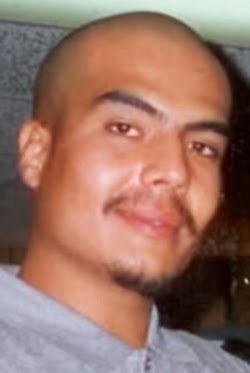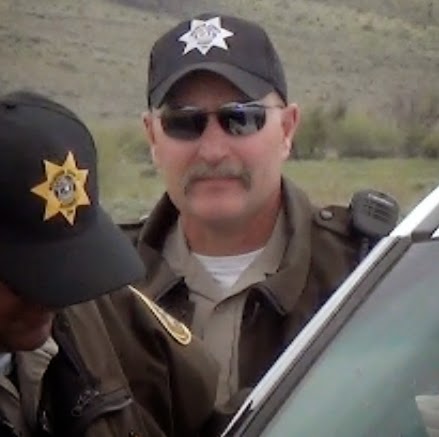 |
| ISP Trooper Justin Klitch conducts a pretext stop, searching for weed. |
One of the risks
of operating a medical marijuana dispensary is the possibility of attracting unwanted
attention from violent, dishonest people willing to defraud and even kill
others in order to indulge their addiction.
When a man
calling himself “Dustin
Hankins” showed up at the 45th
Parallel, a medical marijuana co-op in Ontario, Oregon, the staff received
him in good faith. “Hankins,” who had made a 70-mile trip across the state line
from Boise, presented an Idaho driver’s license and paperwork from his doctor
claiming that he suffered from severe pain as a result of a work-related
shoulder separation. He had previously contacted the clinic by telephone to find
out how he could obtain medicinal marijuana.
Once “Hankins”
had arrived at the clinic the staff inspected his documents and filled out the
necessary paperwork for him to receive an Oregon Medical Marijuana Program card. A staffer named John Turner explained the importance of complying
with Oregon regulations before “Hankins” could obtain medicinal marijuana. Once
all of the legal details were in order, “Hankins” paid $165 to purchase a small
amount of a cannabis strain called “Super Lemon Haze.”
Nothing about
this August
14, 2012 transaction seemed out of the ordinary to the people running the
45th Parallel. The clinic staff believed that they had provided a
service to a man suffering from persistent pain and muscle spasms.
The letter “Hankins”
provided from Dr. Clinton Mallari, a Boise pain specialist, emphasized that
the patient was not “a surgical candidate for his condition” and that he was “reluctant
to perform any more injections on him.” “Hankins” presented all of the
necessary documentation, and the
marijuana was provided in strict compliance with Oregon law.
What the 45th
Parallel staff didn’t know was that “Hankins” had committed interstate
wire fraud, suborned Dr. Mallari into falsifying medical records, and
obtained a counterfeit Idaho driver's license. Nor did they know that “Hankins”
was an alias used by someone who about ten
years earlier had shot a man in the head, leaving the victim paralyzed for
eight years before he finally died from complications of the shooting. Most
importantly, the staff at 45th Parallel had no idea that Hankins and
his accomplices had cased out their operation and intended to steal its assets.
“Dustin Hankins”
was actually Dustin
T. Bloxham, a Boise-based agent of the Drug Enforcement Administration. The money he paid for the cannabis was provided by the Malheur County Sheriff's Office, which has been rewarded with a huge windfall in fines and other proceeds from the clinic.
Acting beyond his jurisdiction, and without authorization from US Attorney for
Idaho Wendy Olson, Bloxham contacted Detective Brad Williams of
the Malheur County Sheriff's Office in Vale, Oregon to organize an
undercover operation targeting the 45th Parallel. That operation culminated in a
September 11, 2012 raid on the co-op and marijuana growers associated with it.
Sixteen
members of the coop were indicted. All but two – co-founders William
Esbensen and Raymond Kangas – were eventually given probation; they were also required
to pay fines directly to the Malheur County Sheriff's office. On
June 6, Esbensen and Kangas were found guilty on multiple counts of
“racketeering.” In essence, they were convicted of a conspiracy to offer a
legally recognized medicine to people who needed it. They are presently
confined at the Malheur County Jail awaiting sentencing. Kangas, who had no
prior criminal record, is on suicide watch, which means that he is in danger of
becoming Bloxham's second victim.
In March 2012,
Esbensen, who owned a car dealership and a construction business in addition to
the 45th Parallel, was the subject of multiple “pretext
stops” by officers from multiple agencies associated with the High Desert
Narcotics Task Force (HDDTF).
“I decided to
sell a camper on Craig's List,” Esbensen explained in an interview several
weeks ago. “After I got an offer, I put a dealer plate on the rear of the
camper and drove it from Vale to the clinic in Ontario, where I cleaned it up
and got it ready to deliver to the buyer in Boise.”
| Press conference in Vale following 45th Parallel bust. Where's the weed, Brian? |
By that time, the
45th Parallel was under relentless surveillance by the HDDTF,
which was constantly intercepting Idaho-bound traffic from the clinic. When
Esbensen left the parking lot, the officers put their well-rehearsed plan into
action.
“A few blocks
away from my clinic, I was stopped by an Oregon State Trooper,” Esbensen
continued. “He told me that a taillight wasn't working, so I fixed it there by
the side of the road. While I was working, this guy goes, `It kind of smells
like pot.' I called his bluff, telling him he was lying. He didn't know what to
say, so he let me go.”
Esbensen made it
to the I-84 exit, and was just barely across the state line when he was stopped
by two Payette County Sheriff's deputies for a supposed “license plate
violation” for displaying a single dealer's plate, as state law requires.
“Sure enough, as
soon as they got near the vehicle, one of them said, `Hey, it kind of smells
like pot,'” Esbensen recounted, his voice laden with weary disgust, Esbensen
once again told the officers they were lying.
“You must think
I'm really stupid,” he told the deputies. “Why would I be bringing pot into
Idaho?”
The Payette
County deputies let Esbensen go, but trailed him all the way to the county line
– where they handed him off to an even larger contingent of costumed pests.
The moment he
reached Canyon County “I was pulled over again – and this time there were five
state police cars, in addition to the DEA, sheriff's deputies, and a K9 officer
with a police car. The moment they stopped me, one of the officers shouted,
`Get out of the car – it smells like pot!' I told him he was lying, and they
sat me down in the back of a cop car while they ran the drug dog all around the
camper.”
In
his affidavit, ISP Trooper Christopher Cottrell claimed that when Esbensen
rolled down his window, “I could immediately smell the strong odor of marijuana
coming from the vehicle.” That was a lie, of course: The drug-sniffing dog – which was trained not
only to detect marijuana, but to follow prompts – absolutely failed to “alert”
to the vehicle, much to the frustration of the road pirates who anticipated a
headline-snagging bust and a lucrative forfeiture haul.
“They couldn't
take it,” Esbensen recalled with a chuckle. “They didn't have any probable
cause, and I had explicitly refused to consent to a search, but they went into
the trailer anyway and searched it for 35 minutes. They found nothing but the
cleanest trailer they had ever seen. And they also went into my personal
effects – which they had no legal right to do – and they eventually found a
single joint.”
“A search of the
vehicle revealed a marijuana joint insider a black knap sack [sic] on the passenger
seat,” in addition to “residue” in some baggies found therein, Cottrell later
stated in his
official report, in which the trooper implicitly claimed to possesses olfactory
powers worthy of the Last Son of Krypton: His uniquely acute sense of smell
detected a “strong odor” from a single joint that had eluded detection by a
trained drug-sniffing dog.
“We got it!”
snarled Cottrell to Esbensen, his face contorted in triumph as he held aloft the
solitary, forlorn joint. “There you go – it's pot! Your ass is going to jail!”
“For a single
joint?” Esbensen replied, shaking his head in resigned disgust. “That's a
single ounce of marijuana, which is a misdemeanor. Write me a ticket.”
Although this
well-coordinated operation failed to find evidence of any criminal offenses by
Esbensen, it did yield some valuable intelligence.
“The one thing
they found was my briefcase, which they held on to for several weeks,” Esbensen
points out. “This case got passed along to three or four prosecutors, who
didn't want to touch it. Eventually a judge ordered them to give me back my
briefcase `before [I] sued someone.'”
The briefcase had
a security lock to prevent unauthorized access. When Esbensen retrieved it, he
discovered that the lock had been forced, and all of the privileged information
in the case had been copied.
“They had access
to our client list, our tax records, and all of our business information,” he
summarizes.
That illegally
acquired information was provided to DEA Agent Dustin Bloxham in Boise. Despite
the fact that the 45th Parallel was located in another state, the
prospect of seizing its assets was irresistible.
“Attached is a
copy of some evidence that was seized from [Esbensen's] vehicle,” Bloxham
wrote in a March 29 2012 email to Marc Haws, an assistant US attorney for Idaho.
“Thought maybe if you guys had a moment, you might be able to look through it
and see if they are doing some pretty good business. I had glanced over it and
it appears to me that some decent money is coming out of that business.”
Missing from that
missive was any allegation of criminal behavior on the part of Esbensen and his
associates – for very good reason: They were doing their considerable best to
operate strictly within the law, as it was commonly understood.
“Our books were
in order and they proved that we were selling all of our medicine at the
legally defined price,” Esbensen told me. “We were one hundred percent
transparent. We were part of the local Chamber of Commerce. We held town hall
meetings and invited the cops.”
Esbensen's
unabashed promotion of cannabis as a medicine earned the resentment of
prohibitionists in Malheur County, and the malevolent attention of Agent
Bloxham, who later testified that he first learned of the 45th
Parallel's operations through the media. It also attracted the attention of
clients living in Idaho and other nearby states that still treat marijuana
consumption as if it were a crime.
“I've dealt with
people from both Idaho and Oregon who have sought help for cancer, Multiple
Sclerosis, epilepsy,” Esbensen attests. “We had at least 100 to 150 patients
who came to us trying to get off prescription pain pills – sometimes up to
twenty-five pills a day. This included Oxycontin and other dangerous drugs.
Many of them were sent over from Idaho – and even up from Utah – by doctors who
couldn't help them, but wanted to see them get better. And if medical marijuana
were widely accepted, the government and its allies in the pharmaceutical companies
wouldn't get their pinch.”
Bloxham didn't
just want a “pinch”; he wanted to grab everything he could from the 45th
Parallel. He pitched the idea to US Attorney Olson, who – in a display of unwonted
restraint – declined to approve the investigation.
Bloxham was asked
about jurisdictional issues during his testimony in the bench trial of Esbensen
and Kangas. Undaunted by the fact that he had neither authorization from the
Justice Department, nor an invitation from the Malheur County Sheriff's Office
(which would have to deputize him to operate in its jurisdiction), Bloxham
simply ran the investigation as a freelancer. He later claimed on the witness
stand that “My jurisdiction is the entire United States.” To validate that
claim he cited his previous work with a specialized DEA task force in
California that operated in neighboring states as well.
Rather than
demonstrating Bloxham’s professionalism and competence, his record in
California suggests that he is an opportunistic killer.
On April 17,
2002, Bloxham took part in a
military-style assault on the Santa Paula, California home of 22-year-old Edward
Barron, who had allegedly sold meth to an undercover cop.
“The officers
used a `Trojan Horse maneuver’ in which an unmarked car cruised by the house to
divert [Barron’s] attention,” summarizes
a 2007 appellate court ruling.
Fearing that he
was being set up for a drive-by shooting, Barron told his girlfriend into his
house, grabbed a gun to defend himself and his three young children, and went
back outside. The decoy vehicle drove by again. As it did so, an unmarked DEA
van pulled up and disgorged four agents, Bloxham among them. The masked agents
approached Barron with drawn guns.
Barron tried to
retreat into his home – an action dishonestly described by the police as “advance[ing]
towards the house – and allegedly reached for his gun. Bloxham fired three
shots, two of them hitting the victim in the back. The first severed his spinal
cord, leaving him a quadriplegic.
During a March
2004 preliminary hearing, Bloxham – who doubtless describes himself as a trained
observer – claimed that Barron, who was right-handed, fired his gun over his
left shoulder while retreating into the house. When that account didn’t comport
with the physical evidence, Bloxham
was allowed to revise his testimony: During Barron’s trial, the DEA agent
claimed that the victim had “held the gun pressed to his chest” and pointed it
at the officers.
On the basis of
this self-contradictory testimony, Barron
was found guilty of “assault with a firearm” and given
three years’ probation. The prosecutor generously offered a discounted
sentence because Barron, who suffered from incurable total paralysis, was entirely
dependent on his family. He died in June 2010 at age 30 of pneumonia, which was
an outgrowth of his condition.
The
Ventura County Medical Examiner ruled Barron’s death a “homicide.” The
killer was Dustin Bloxham, who was rewarded with
a federal “Medal of Valor” and the DEA’s Badge of Valor. He eventually
returned to his native Idaho, where he carries out undercover operations on
behalf of the local prohibitionist apparat – which Bill Esbensen characterizes
as a “syndicate.”
“I'm convinced
that there are drug dealers with badges in the Treasure Valley,” Esbensen told
me a few weeks before being sent to jail. “The day we were raided, police on
both sides of the Snake River hit a total of 11 grow areas in two states. They
claimed to have seized seven hundred mature marijuana plants – each of them the
size of a Christmas tree, basically. This was enough to fill a parking lot. Yet
we've only been able to account for about one-tenth that number. So what
happened to all of the rest? Did they end up in the hands of people who are
working both sides of the law? Did somebody in law enforcement steal enough
confiscated pot to fill a parking lot?”
Esbensen’s
suspicions have merit. During his trial, Detective Williams testified that all
of the confiscated marijuana plants had been taken to the nearby Lytle Landfill and
buried. The manager of the landfill told me that he believes the marijuana
plants were dumped into “a really big hole” but had no records confirming that
this happened. When I inquired about this at the Solid Waste Disposal
department, I was again told that no records of the burial exist and directed
to “ask the Sheriff’s Office” – whose uncorroborated story was already a matter
of record.
“These guys are
racketeers – the state police on both sides of the river, the Malheur County
Sheriff's Office, the Payette County Sheriff's Office, the DEA, they're all
mobbed up and running what amounts to a syndicate,” Esbensen contends. “They
get money from the Feds for every seizure, whether or not actual trafficking is
taking place. And as I said, nobody can account for all of the marijuana they
actually confiscate.”
Some of the
seized marijuana may have found its way into the possession of a disaffected former
45th Parallel associate, a woman with a criminal history who is now
operating a medical marijuana facility -- or as she would describe it, a "wellness center" -- in Ontario that is located within 1000
feet of a school.
The owner, Tricia
Gardner, was among the chief witnesses against Esbensen. She filed paperwork to
open her clinic the day prior to the raid on the 45th Parallel, and her
business is a carbon copy of the one that had been operated by Esbensen and
Kangas. She was arrested and charged along with fifteen of her associates, and agreed
to a deal involving a $6000 fine (which, like the others, was to be paid
directly to the sheriff’s office) and probation. A pending forgery
charge against her was also quietly dropped.
Gardner’s
meth-related criminal record disqualifies her from operating that clinic, which
is also illegal under a city medical marijuana moratorium that recently went into effect.
Its proximity to a school would normally attract the attention of the DEA. She clearly enjoys the protection of the “syndicate”
Esbensen describes – and whose activities we will continue to examine in our
next installment.
Notes and Asides
My friends, this is a very substantial story, and I hope you will follow it to the end. I certainly intend to do so -- and I can use your help. The blessing of being a free agent is that I can immerse myself in stories of this kind and report them without being filtered by timorous editors (so far, not a word about any of this has been published in the local press). The curse of my condition is that I have no resources to fund my work and pay my expenses. I'm grateful beyond measure for the generosity so many of you have displayed, and earnestly hope you can continue to help. Thank you so much!
The inimitable Jeffrey Tucker, founder of the Liberty.me online community, recently interviewed me about police militarization, the Drug War, and related topics. The interview can be seen here.
Listen to or download the most recent Freedom Zealot Podcast here.
Once again, I could really use your financial help -- and we are grateful for your generosity. God bless.
Dum spiro, pugno!






4 comments:
Very nice piece Mr Grigg. Your reference to 'pretext stops' reminds me of something from my theological training. A scripture without context is just a pretext to whatever you want it to mean. Sadly while many of us in professional and private lives strive to gain and add context to the existence around us a privileged few via claimed authority create pretext at will for whatever ends they wish.
Reading this I wonder how 'close to home' this corruption is occurring and wonder about your safety and the safety of your family. Clearly you are not someone whom local law enforcers see as anything other than an enemy? I think many whom follow your work would enjoy some time spent sharing how your work has effected your life with local leos, federal travel, are you on any lists you know of, etc.
Regards, Blessings, and Best Wishes,
Phillip McDaniel
This is refreshing, to see the other side of the story. Not from the perspective of the so called law. I'll be donating as soon as I have funds in my paypal acc. Keep up the good work Mr Griggs.
Big thumbs up from me
committing crimes, including state and federal crimes, to 'catch' those perceived to be 'criminals', is an absurd twisting of 'law'. the 'morality' evident: two wrongs make one party 'right'. stupid? you bet!
in the end, it is all about the money. corrupt and compromised 'servants' have run amok and now run roughshod over us all with nary a whimper from the beseiged.
post Constitutional America, aka amerika, sucks. criminals are in charge at all levels - federal, state and local - it is obvious and yet it continues, worsening as the effects of all unchallenged criminal organizations are wont to do.
unless and until told to STOP, this type behavior will continue, unabated and worsening daily. to get such activity to stop requires a concerted effort by the citizenry. this is the problem. the citizenry simply does not care.
donna from ND:
"unless and until told to STOP, this type behavior will continue, unabated and worsening daily. to get such activity to stop requires a concerted effort by the citizenry. this is the problem. the citizenry simply does not care."
I'm not sure most people are even aware of what is going on. Those I hear seem to grab onto some bit of focused hatred toward one category of amorphous 'evil guys' or other.
If a local someone gets 'in trouble' with those in power then he most assuredly has done something criminally wrong to deserve it.
There appears to be little awareness of how much of our freedom is gone. Confronting this corruption at the local level has served only to label me as being 'militant'.
I'm not sure how to fix Ignorance when it is convinced otherwise.
Yes! Ideally, large groups of people who know their rights and are willing to stand unitedly is the ANSWER. Many will complain, but few have the courage to become public with their grievance.
Post a Comment